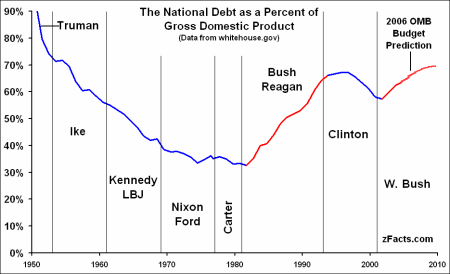It's Just Like a Mini-Mall
(Thanks to Ben Stone for the tip.)
Determinate Negation offers commentary on contemporary events and books from the point of view of a scholar of religion and philosophy, especially through the complexifying filter of Hegelianism.
The point is that government and religion need to be separate. Why? Because the framers of the constitution feared tyranny. If those who have the power of the sword can also invoke God's will as justification for the use of the sword, then there will be no way to prevent tyranny. We would in effect have a king chosen by divine right. All of this had happened again and again in Europe, and the framers were afraid it could happen here too if they did not prevent it. So they made sure that the government which has the power of the sword was not permitted to invoke religious authority as justification for its decisions.In reading Al Gore's The Assault on Reason, I came across some passages by those framers that might do the trick:









So Samson went and caught three hundred foxes, and took some torches; and he turned the foxes tail to tail, and put a torch between each pair of tails. When he had set fire to the torches, he let the foxes go into the standing grain of the Philistines, and burned up the shocks and the standing grain, as well as the vineyards and olive groves. (Judges 15:4-5)Or maybe there will just be a button to push so that we can hear him sing in victory:
With the jawbone of a donkey, heaps upon heaps,That's some good biblical ass-kicking, I mean, spirit-triumphing.
With the jawbone of a donkey I have slain a thousand men. (Judges 15: 16)
“After 10 years and $1.5 billion in public funds these failed abstinence-only-until-marriage programs will go down as an ideological boondoggle of historic proportions,” said James Wagoner, President of Advocates for Youth.
“The tragedy is not simply the waste of taxpayer dollars, it is the damage done to the young people who have been on the receiving end of distorted, inaccurate information about condoms and birth control. We have been promoting ignorance in the era of AIDS, and that’s not just bad public health policy, its bad ethics.”
As I look back on my dozen years of teaching English, I wish I'd spent less time dragging my students through the classics and more time showing them how to strike out on their own and track down new books they might enjoy. Without some sense of where to look and how to look, is it any wonder that most people who want to read fiction glom onto a few bestsellers that everybody's talking about?I know the Harry Potter books aren't masterpieces by any means, but they could be like "gateway" drugs into the more intoxicating stuff. Remember, complaining is not equivalent to critique or protest. Sheesh.
A better solution would be to eliminate schools of education and force teachers to actually specialize in a major. Currently you can't even teach primary or secondary school in most states unless you have an education degree. But education majors (the major program itself, not the individual students) are--as virtually anyone at a university outside the ed school will tell you--a joke.His recommendation is to eliminate the education major and all schools of education, instead making our future teachers choose a "real" major. In my anonymous and untenured way, I second that and I know many others who would too. In any case, I've never quite understood why people who obviously struggled through school for years would want to repeat the experience for the rest of their lives.
As it stands now, go to virtually any university in the country. Look at the grades broken down by major. You'll find that education majors have one of the highest GPAs. Ed schools like to say that this is because they get the best students in the university, or because the screening process for their majors is so rigorous. But it isn't true. Ed majors are among the weakest in any university. If you doubt this, go check out LSAT and GRE scores broken down by major. Ed majors are always near the very bottom of the list. Weak students plus a weak, frivolous program plus astronomically high grades...well, these things are not going to generate top-notch teachers.
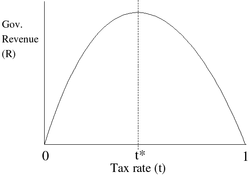
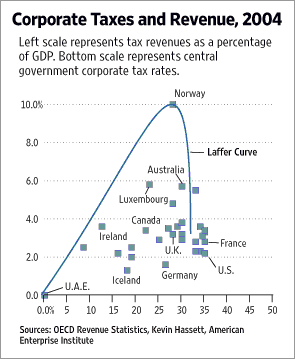
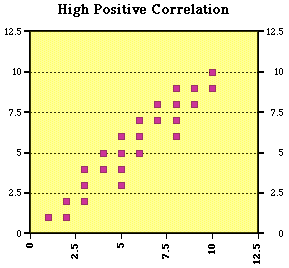
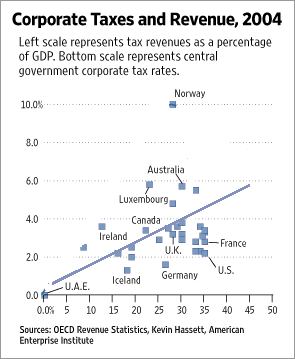
One more point, with respect to "omitting Norway": Personally I see no need to omit Norway. I do see a need to plot the Norway point on the graph correctly. The revenues plotted on the vertical scale include oil excise taxes levied on corporations. The tax rates plotted on the horizontal scale do not--hence the Norway "tax rate" of 28% rather than the correct 52%. Move Norway out to its proper position--with the same tax concept on both axes--and everything is fine.Sheesh.
The study authors reviewed health care spending data on 30 countries from the Organization for Economic Cooperation and Development (OECD) for the year 2002. U.S. citizens spent $5,267 per capita on health care. The country with the next highest per capita expenditure, Switzerland, spent $3,446 per capita. The median OECD country spent $2,193 per capita.Having noted this fact, let's consider a few further costs associated with our system that even our Milton Friedman fans should appreciate. (I'm indebted to Kevin Drum and Matthew Yglesias for much of the following.)
Many of the faults for which women are reproached--mediocrity, laziness, frivolity, servility--simply express the fact that their horizon is closed. It is said that woman is sensual, she wallows in immanence; but she has first been shut up in it. The harem slave feels no morbid passion for rose preserves and perfumed baths; she has to kill time.
Her frivolity has the same cause as her "sordid materialism"; she considers little things important for lack of any access to great things, and, furthermore, the futilities that fill her days are often of the most serious practical concern to her.
The truth is that when a woman is engaged in an enterprise worthy of a human being, she is quite able to show herself as active, efficient, taciturn--and as ascetic--as a man.
And finally, if woman is earthly, commonplace, basely utilitarian, it is because she is compelled to devote her existence to cooking and washing diapers--no way to acquire a sense of grandeur! It is her duty to assure the monotonous repetition of life in all its mindless factuality.
Her life is not directed toward ends: she is absorbed in producing or caring for things that are never more than means, such as food, clothing, and shelter. These things are inessential intermediaries between animal life and free existence.
Woman is shut up in a kitchen or in a boudoir, and astonishment is expressed that her horizon is limited. Her wings are clipped, and it is found deplorable that she cannot fly.
Even when things are quiet, she feels anxious; lying half asleep at night her rest is disturbed by the nightmare shapes that reality assumes; and thus for woman condemned to passivity, the inscrutable future is haunted by phantoms of war, revolution, famine, poverty; being unable to act, she worries. [She] flounders in confusion and darkness; she gets used to it because she does nothing; in her imagination all possibilities have equal reality: the train may be derailed, the operation may go wrong, the business may fail. What she is endeavoring to exorcize in her gloomy ruminations is the specter of her own powerlessness.
Her anxiety is the expression of her distrust of the world as given; if it seems threatening, ready to collapse, this is because she is unhappy in it. For most of the time she is not resigned to being resigned; she knows very well that she suffers as she does against her will: she is a woman without having been consulted in the matter.
A free individual blames only himself for his failures, he assumes responsibility for them; but everything happens to women through the agency of others, and therefore these others are responsible for her woes. Her mad despair spurns all remedies.... She knows that her trouble goes deeper than is indicated by the pretexts she advances for it, and she is aware that it will take more than some expedient to deliver her from it. [...] She has been promised compensations, she has been assured that if she would place her fortune in man's hands, it would be returned a hundredfold--and she feels she has been swindled. She puts the whole masculine universe under indictment. Resentment is the reverse side of dependence: when one gives all, one never receives enough in return.
Whenever tears are insufficient to express her revolt, she will make scenes of incoherent violence as to abash a man still more. In some circles a husband may strike his wife actual blows; in others he declines to use violence precisely because he is the stronger and his fist is an effective weapon. But a woman, like a child, indulges in symbolic outbursts: she can throw herself on a man, beating and scratching, but it is only a gesture. Yet above all she is engaged in expressing, through the pantomime of the nervous crisis, the insubordination she is unable to carry out in actuality.
There are many aspects of feminine behavior that should be interpreted as forms of protest. We have seen that a woman often deceives her husband through defiance and not for pleasure; and she may be purposely careless and extravagant because he is methodical and economical. Misogynists who accuse woman of always being late think she lacks a sense of punctuality; but as we have seen, the fact is that she can adjust herself very well to the demands of time. When she is late, she has deliberately planned to be. Some coquettish women think they stimulate the man's desire in this way and make their presence the more highly appreciated; but in making the man wait a few minutes, the woman is above all protesting against that long wait: her life.
Women have no grasp on the world of men because their experience does not teach them to use logic and technique; inversely, masculine apparatus loses its power at the frontiers of the feminine realm. There is a whole region of human experience which the male deliberately chooses to ignore because he fails to think it: this experience woman lives. The engineer, so precise when he is laying out his diagrams, behaves at home like a minor god: a word, and behold, his meal is served, his shirts starched, his children quieted; procreation is an act as swift as the wave of Moses' wand; he sees nothing astounding in these miracles. The concept of a miracle is different from the idea of magic: it presents, in the midst of a world of rational causation, the radical discontinuity of an event without cause, against which the weapons of thought are shattered; whereas magical phenomena are unified by hidden forces the continuity of which can be accepted--without being understood--by a docile mind. The newborn child is miraculous to the paternal minor god, magical for the mother who has experienced its coming to term within her womb. The experience of the man is intelligible but interrupted by blanks; that of the woman is, within its own limits, mysterious and obscure but complete. This obscurity makes her weighty; in his relations with here, the male seems light: he has the lightness of dictators, generals, judges, bureaucrats, codes of law, and abstract principles.
Woman does not entertain the positive belief that the truth is something other than men claim; she recognizes, rather, that there is not any fixed truth. It is not only the changing nature of life that makes her suspicious of the principle of constant identity, nor is it the magic phenomena with which she is surrounded that destroy the notion of causality. It is at the heart of the masculine world itself, it is in herself as belonging to this world that she comes upon the ambiguity of all principle, of all value, of everything that exists. She knows that masculine morality, as it concerns her, is a vast hoax. Man pompously thunders forth his code of virtue and honor; but in secret he invites her to disobey it, and he even counts on this disobedience; without it, all that splendid façade behind which he takes cover would collapse.
He lauds chaste and faithful wives, but he asks his neighbor's wife to commit adultery. We have seen how hypocritically men decree that abortion is criminal, when each year in France a million women are put by men in a position to need abortion; often enough the husband or lover demands this solution; often, too, they assume tacitly that it will be adopted if necessary. They count openly on the woman's willingness to make herself guilty of a crime: her "immorality" is necessary to the harmony of the moral society respected by men.
The most flagrant example of this duplicity is the male's attitude toward prostitution, for it is his demand that creates the supply.
Woman plays the part of those secret agents who are left to the firing squad if they get caught, and are loaded with rewards if they succeed; it is for her to shoulder all man's immorality: not the prostitute only, but all women who serve as sewer to the shining, wholesome edifice where respectable people have their abode.
Woman has been assigned the role of parasite--and every parasite is an exploiter.
Man even demands play-acting: he wants her to be the Other; but all existents remain subjects, try as they will to deny themselves. Man wants woman to be object: she makes herself object; at the very moment when she does that, she is exercising a free activity. Therein is her original treason; the most docile, the most passive, is still a conscious being; and sometimes the fact that in giving herself to him she looks at him and judges him is enough to make him feel duped; she is supposed to be only something offered, no more than prey. He also demands, however, that this "thing" give herself over to him of her own free will: in bed he asks her to feel pleasure; in the home she must sincerely recognize his superiority and his merits. She is, then, to feign independence at the moment of obedience, although at other moments she actively plays the comedy of being passive.
There is a justification, a supreme compensation, which society is ever wont to bestow upon woman: that is, religion. [...] Woman is asked in the name of God not so much to accept her inferiority as to believe that, thanks to Him, she is the equal of the lordly male; even the temptation to revolt is suppressed by the claim that the injustice is overcome. Woman is no longer denied transcendence, since she is to consecrate her immanence to God; the worth of souls is to be weighed only in heaven and not according to their accomplishments on earth. [...] That is why the little girl and the adolescent are much more fervent devotees than their brothers; the eye of God, which transcends the boy's transcendence, humiliates him: under this mighty guardianship he will remain a child forever; it is a more radical castration than that threatened by his father's existence. But the "eternal child," if female, finds her salvation in this eye that transforms her into a sister of the angels.
Although subordinated to the law of men by the will of God Himself, woman none the less finds in Him a mighty refuge from them. [...] The passivity enforced upon woman is sanctified. Telling her beads by the fire, she knows she is nearer heaven than is her husband gadding about at political meetings. There is no need to do anything to save her soul, it is enough to live in obedience. The synthesis of life and spirit is accomplished: a mother not only engenders the flesh, she produces a soul for God; and this is a greater work than penetrating the futile secrets of the atom. With the heavenly Father's connivance, woman can boldly lay claim to the glory of her femininity in defiance of man.
The fact is that woman makes religion a pretext for satisfying her own desires. Is she frigid, masochistic, sadistic? She finds holiness in renouncing the flesh, in playing the martyr, in crushing every living impulse around her. [...] For her part, the woman of easy virtue easily arranges things with God: the assurance of obtaining absolution for her sins tomorrow often helps the pious woman conquer her scruples today. Whether she has chosen asceticism or sensuality, pride or humility, the concern she feels for her salvation leads her to yield to that pleasure which she prefers to all others: namely, being occupied with herself.
It is evident that woman's "character"--her convictions, her values, her wisdom, her morality, her tastes, her behavior--are to be explained by her situation. The fact that transcendence is denied her keeps her as a rule from attaining the loftiest human attitudes: heroism, revolt, disinterestedness, imagination, creation; but even among the males they are none too common.
The office universe which, among other things, Kafka has described, this universe of formalities, of absurd gestures, of purposeless behavior, is essentially masculine. Woman gets her teeth more deeply into reality; for when the office worker has drawn up his figures, or translated boxes of sardines into money, he has nothing in his hands but abstractions. The baby fed and in his cradle, clean linen, the roast, constitute more tangible assets; yet just because, in the concrete pursuit of these aims, she feels their contingence--and accordingly her own--it often happens that woman does not identify herself with them, and she still has something left of herself.
From the depths of her solitude, her isolation, woman gains her sense of the personal bearing of her life. The past, death, the passage of time--of these she has a more intimate experience than does man; she feels deep interest in the adventures of her heart, of her flesh, of her mind, because she knows that this is all she has on earth. And more, from the fact that she is passive, she experiences more passionately, more movingly, the reality in which she is submerged than does the individual absorbed in an ambition or a profession.
But simply from the fact that liberty in woman is still abstract and empty, she can exercise it only in revolt, which is the only road open to those who have no opportunity of doing anything constructive. [...] Resignedness is only abdication and flight, there is no other way out for woman than for her liberation.
This liberation must be collective, and it requires first of all that the economic evolution of woman's condition be accomplished. There have been, however, and there are many women trying to achieve individual salvation by solitary effort. They are attempting to justify their existence in the midst of their immanence--that is, to realize transcendence in immanence. It is this ultimate effort--sometimes ridiculous, often pathetic--of imprisoned woman to transform her prison into a heaven of glory, her servitude into sovereign liberty, that we shall observe in the narcissist, in the woman in love, in the mystic.
Richard Nixon--60%Not only is President Bush vying for the most unfavorable, he actually surpasses President Nixon in the "very unfavorable" category:
George W. Bush--59%
Richard Nixon:That 40% is by far the worst in history.somewhat unfavorable--35%; very unfavorable--25%George W. Bush:somewhat unfavorable--19%; very unfavorable--40%
In 1979, the top 0.1 percent of taxpayers earned 2.01 percent of total U.S. income; in 1999, they earned 6.63 percent. This group's share of total income more than tripled, while its share of federal taxes paid only increased by a little more than double. Similarly, in 1979, the richest 5 percent of taxpayers earned 20.83 percent of all income; in 1999, they earned 30.91 percent. This group's share of total earnings increased by about 50 percent, while its share of federal taxes rose only about 21 percent.2. The following chart (via Mark Thoma) shows the percentage of national debt as a share of our Gross Domestic Product. (See the Whitehouse website here to verify the data.) Notice the red part of the line.
